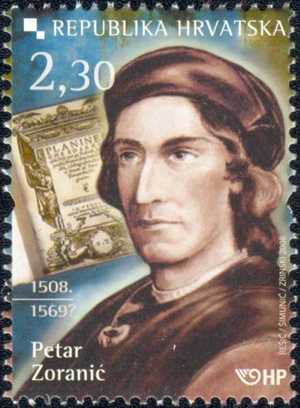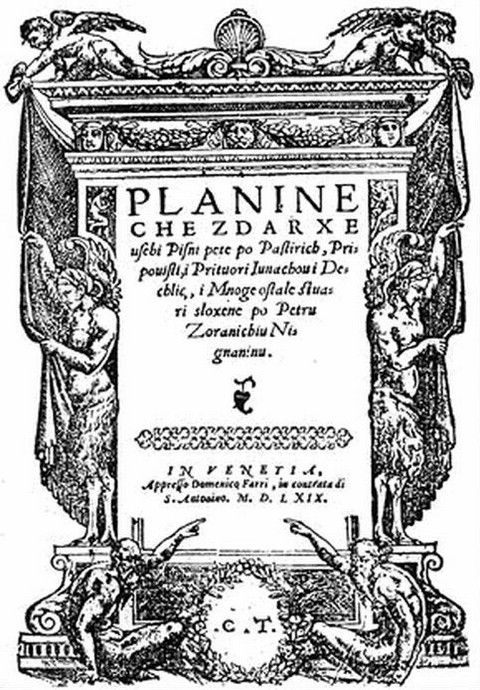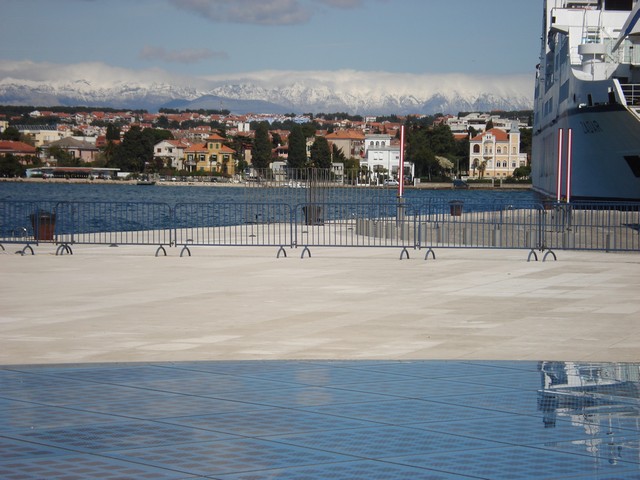
Sponsored Ads
|
» Home
» Croatian Language » Petar Zoranic 1508-1569 important Croatian Renaissance writer
» Home
» People » Petar Zoranic 1508-1569 important Croatian Renaissance writer
» Home
» Education » Petar Zoranic 1508-1569 important Croatian Renaissance writer
» Home
» Culture And Arts » Petar Zoranic 1508-1569 important Croatian Renaissance writer
| Petar Zoranic 1508-1569 important Croatian Renaissance writer |
| By Prof.Dr. Darko Zubrinic |
Published
12/17/2008
|
Croatian Language , People , Education , Culture And Arts
|
Unrated
|
|
|
|
Petar Zoranić is one of the pillars of Croatian Renaissance literature, part 1
  Petar Zoranić: Planine (The Mountains), published in Venice in 1569 in Croatian language.
PETAR ZORANIĆ (1508. – 1569.?)
Život Petra Zoranića do danas je najvećim dijelom ostao zagonetka. U tematskom i žanrovskom smislu imao je svoje nasljednike, ali i suvremenike. O Zoranićevu životu i školovanju postoji vrlo malo arhivskih podataka; neke iznosi sam Zoranić u Planinama, no pitanje je jesu li oni autentični. Pretpostavlja se da je rođen 1508. godine.
Predci su mu bili plemići Tetačići iz Like, a kad su Turci krajem 15. stoljeća napali Nin, obitelj se preselila u utvrđeni Zadar.
Zoranić se vraća u Nin kad su se stišali turski napadi. Rođen je u Zadru od oca Ivana i majke Elizabete Medulla.
Pretpostavlja se da se školovao u Padovi, a najvjerojatnije je imao pravničku naobrazbu jer je radio kao notar i izdavatelj dokumenata javne vjere na latinskom, talijanskom i hrvatskom jeziku za što je bio obvezan studij pravnih znanosti.
U posveti Planinama Zoranić ninskoga kanonika Mateja Matijevića naziva svojim učiteljem tako da je zasigurno bio odgojen u humanističkom duhu. Od Zoranićeva književnog rada sačuvano je samo djelo Planine, u prozi i stihovima, a koje se obično definira kao prvi hrvatski pastoralni roman (djelo je datirano 1536., a tiskano 1569. u Veneciji). Ostao je sačuvan samo jedan jedini primjerak Planina. Iz Zoranićeva romana mogli bi se rekonstruirati njegovi prijatelji i obitelj. Tako bi "lipa, plemenita i gizdava" Jele mogla biti njegova majka Elizabeta, dok je najveća zagonetka Jaga kojoj posvećuje pjesmu, a čije bi otkrivanje identiteta značilo odgonetanje osobe zbog koje i poduzima ovo putovanje.
Iz Planina se zna i za druga dva Zoranićeva djela - Ljubveni lov i Vilenicu - koji se spominju u poglavlju Perivoj od slave. Puni naslov Zoranićeva romana glasi Planine ke zd(a)rže u sebi pisni pete po pastirih, pripovisti i pritvori junakov i deklic i mnoge ostale stvari složene po Petru Zoraniću Ninjaninu. Osnovni poticaj njegovu stvaranju jaki je osjećaj rodoljublja u trenutcima napada Turaka, ali mu isto tako ni književna komponenta nije nepoznata.
Planine u 24 poglavlja opisuju i pripovijedaju o putovanju pastira Zorana, pod čijim se likom nedvojbeno krije sam pisac, po zavičajnim krajevima kako bi se riješio "ljubvenoga betega". Put glavnog junaka Zorana počinje u Vodicama kod Nina, zatim ide morskim putem do današnjega Starigrada, penje se potom Velikom Paklenicom na vrh Velebita, odakle ide prema istoku do Dinare, zatim rijekom Krkom do Šibenika i od Šibenika morem mimo Zadra do Zatona pred Ninom i na kraju kopnom do samoga Nina.
Fabula romana oblikovana je kao putovanje po stvarnim predjelima na kojem glavni junak susreće brojne pastire i vile (Zorica, Milost, Dejanira-Dinara, Latinka, Grkinja, Kaldejka, Hrvatica) koje imaju funkciju vodiča ne samo u zbiljske nego i u fiktivne predjele, npr. Perivoj od slave s vilama Latinkom, Kaldejkom, Grkinjom i Hrvaticom. U središtu ovog prizora je Hrvatičina žalost zbog slaboga književnog stvaranja na narodnom (hrvatskom) jeziku te ona kori Hrvate što pišu tuđim jezicima mjesto da se služe svojim.
Zoranićeve Planine bile su jedini roman napisan u hrvatskoj književnosti sve do 19. stoljeća. Ovo djelo, kako svjedoči Zoranić u posveti Mateju Matijeviću, osim u doslovnom smislu treba čitati i kao alegoriju čiji je smisao da milost Božja vodi čovjeka kroz zemaljska zla do konačne spoznaje božanske istine.
Na doslovnoj razini roman je priča o putovanju u kojem glavni junak ispovijeda svoju nesretnu ljubav u obliku autobiografskog zapisa, pripovijeda o svojoj obitelji ili nekim drugim povijesnim osobama (npr. likovi Jeronima i biskupa Divnića povijesne su osobe, a pod likom Marula pastira nedvojbeno se krije pjesnik Marko Marulić).
No roman je također i mimetičan jer se u njemu često eksplicitno govori o nacionalnoj književnosti i kulturi, jeziku, rasutoj baštini, prijetećoj turskoj opasnosti (aktualnost). Sve su to elementi koji Planine određuju kao pastirski, autobiografski i povijesno - društveni roman. Iz Planina možemo raspoznati da je mladi Zoranić iznimno dobro poznavao Ovidijeve Metamorfoze, Vergilijeve Bukolike, srednjovjekovnu književnost, Dantea, Petrarcu, Boccaccia, Cicerona, antičku retoriku... Kao glavni poticaj Zoranićevu djelu spominje se klasični talijanski pastirski roman Arcadia Jacopa Sannazzara (oko 1456. - 1530.), koji je
također strukturiran kao alegorijska autobiografija.
Cikličko komponiranje fragmenata Zoranić preuzima od Boccaccia, a uočen je i utjecaj Danteove Božanstvene komedije. Verzificirani dijelovi Planina koji opjevavaju ljubav pisani su najčešće dvostruko rimovanim dvanaestercima i u petrarkističkoj maniri, što dokazuje da je Zoranić je bio dobar poznavatelj talijanske petrarkističke i religiozno - refleksivne lirike, ali i Marulićeva opusa (Marul pastir čiju Molitvu suprotiva Turkom parafrazira).
Osim brojnih tema, u romanu je prisutna i svijest o hrvatskom jeziku kao bitnome elementu nacionalne književnosti, i to kao samostalna tema i kao sastavni dio njegova rodoljublja.
Neosporno, Zoranić je ostavio neizbrisiv trag u hrvatskoj književnoj povijesti svojom upečatljivom i osebujnom pojavom.
Izvor: Hrvatska pošta
|
PETAR ZORANIĆ (1508 – 1569?)
The life of Petar Zoranić has in greater part remained a mystery up to the present day. In terms of themes and genre he had his
inheritors but also contemporaries. There are few archival data on Zoranić's life and education; some of the data were revealed by Zoranić himself in his novel Planine [Mountains], though whether they are authentic is questionable. It is assumed that he was born in the year 1508.
His ancestors were the noble family Telačić from Lika, and when the Ottomans attacked Nin at the end of the 15th century, the family moved to the fortified town of Zadar.
Zoranić returned to Nin when the Ottoman attacks lessened. He was born in Zadar to his parents, father Ivan and mother Elizabeta Medulla.
It is assumed that he was educated in Padua; most probably he received a lawyer’s education because he worked as a notary and also issued documents of public faith (fidem publicum) in the Latin, Italian and Croatian languages which as its prerequisite had the obligation of having studied jurisprudence.
In the dedication to Planine Zoranić called the Matej Matijević, the Canon from Nin, his teacher, so that he was almost definitely educated in the spirit of humanism. What remained preserved from Zoranić's literary work is only Planine, written in prose and verses, usually defined as the first Croatian pastoral novel. The work was dated as belonging to the year 1536 and printed in 1569 in Venice. Only a single copy of Planine has remained preserved. One could reconstruct the characters of his friends and family from Zoranić's novel. So the character referred to as "beautiful, noble and stylish Jele" could have been his mother Elizabeta, while the greatest mystery is Jaga to whom he dedicated a poem, and whose identity, if revealed, would mean figuring out the person on account of whom he was undertaking that journey.
From the novel Planine it is also made clear that there are two other works written by Zoranić - Ljubveni lov [Amorous hunting] and Vilenica [Fairy] - that are mentioned in the chapter Perivoj od slave [Gardens of glory]. The full title of Zoranić’s novel is rather long: Planine ke zd(a)rže u sebi pisni pete po pastirih, pripovisti i pritvori junakov i deklic i mnoge ostale stvari složene po Petru Zoraniću Ninjaninu [approximately: Planine that contains songs sung by shepherds, stories and transformations of heroes and young girls and many other things put together by Petar Zoranić from Nin]. The basic stimulus for his creation was a strong feeling of patriotism at the moment of the Ottoman attacks, but at the same time he was quite aware of the literary component.
Planine in 24 chapters describe and narrate the story of the journey of Zoran the shepherd, a character that obviously masked
the writer himself, travelling across the native land in order to get rid of his "amorous ailment". The journey of the main hero Zoran starts in Vodice near Nin, then continues in a seaward course to the present-day Starigrad, then it climbs Velika Paklenica reaching the Velebit peak, then it goes eastwards to the Dinara mountain range, then by the Krka river down to Šibenik and from Šibenik by sea past Zadar to Zaton before reaching Nin and finally by land to Nin. The plot of the novel is formed as a journey across real regions where the main hero meets numerous shepherds and fairies (the names are mostly female names, some of them with a definite meaning: Zorica, Milost [Mercy], Dejanira-Dinara, Latinka [Latin girl], Grkinja [Greek girl], Chaldean and Croatian [girls]). These girls have the function of guiding the hero not only into real but into the fictional regions, as e.g. the Gardens of glory with Latinka and the Chaldean, Greek and Croatian fairies. In the centre of this scene we find the sorrow that the Croatian fairy Hrvatica feels owing to the poor literary creation in the native, Croatian language: she rebukes the Croats for writing in foreign languages instead using their own.
Zoranić's Planine were the only novel written in the Croatian literature all through the 19th century. This work, as declared by Zoranić in his dedication addressed to Matej Matijević, except for the literal reading should also be read as an allegory whose meaning is that the grace of God leads the man through earthly evil to the final understanding of divine truth.
On its literal level the novel tells the story of the journey in the course of which the main hero professes his unhappy love in
the form of an autobiographic record, talks about his family or some other historical personages (e.g. the characters of Jerome and bishop Divnić were historical personages, and behind the character of the shepherd Marul the poet Marko Marulić is undoubtedly concealed). On the other hand, the novel is also mimetic because there are frequent occurrences when the national literature and language are quite explicitly discussed, as well as themes like the scattered heritage, threatening Ottoman danger - which was the reality of that time. All these are elements that define Planine as a pastoral, autobiographic and historical-social novel. From the novel Planine we can make out that Zoranić, while still young, knew literature extremely well, starting from Ovid's Metamorphoses, Vergil’s Bucolica or Eclogues, the medieval literature, Dante, Petrarch, Boccaccio, Cicero, classical rhetoric,... The main mostly mentioned stimulus for Zoranić's work is the classic Italian pastoral novel Arcadia written by Jacopo Sannazzaro (around 1456 - 1530), that is also structured as allegoric autobiography.
Zoranić took over the cyclical composition of fragments from Boccaccio and the influence of Dante's Divine Comedy can also be observed. The versified parts of Planine that celebrate love in rhymes, were written mostly in doubly rhymed dodeca - syllabic lines and in the manner of Petrarch, which further proves that Zoranić was a good connoisseur of the Italian Petrarchian and religious - reflective lyric poetry as well as of Marulić's opus (the character Marul, the shepherd, whose Prayer against the Turks Zoranić paraphrased).
Except for numerous themes, in the novel there is also the awareness about the Croatian language present as the crucial element of national literature, both as an individual theme and as a constituent part of his patriotism.
Undoubtedly, Zoranić has left an indelible trace in Croatian literary history by his distinct and singular appearance.
Source: Croatian Post
|  The legendary Croatian mountain of Velebit seen from the plateau of the Monument to the Sun in Zadar. Please, go to the next page below.
|
|
|
|
|